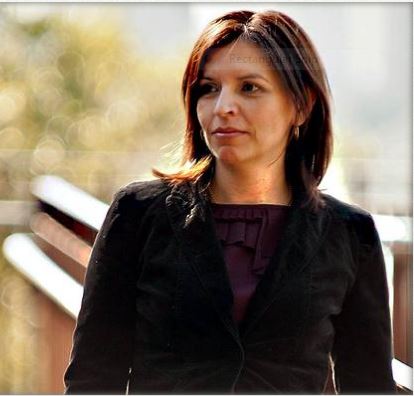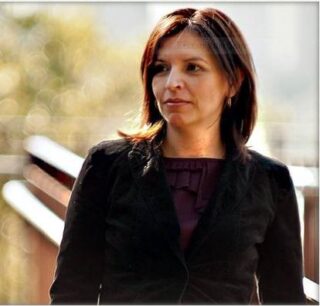- Entry type: Person
- Entry ID: AWE5723
McGlade, Hannah
(1969 – )
- Occupation Aboriginal spokesperson, Academic, Barrister, Human rights activist, Lawyer, Solicitor, Tribunal Member
Summary
Dr Hannah McGlade is a Nyungar human rights lawyer and academic who has published widely on many aspects of Aboriginal legal issues, especially those affecting the lives of Aboriginal women and children. Winner of the West Australian NAIDOC Student of the Year Award in 1996 (she followed this up in 2008 with the NAIDOC Outstanding Achievement Award), she was the first Aboriginal person to graduate from Murdoch University; she was also the first Aboriginal woman to graduate from a Western Australian law school when she graduated LLB (Murdoch) in 1995. She was admitted as a Solicitor and Barrister of the Supreme Court of Western Australia in 1996. In July 2016 she was appointed as a Senior Indigenous Research Fellow at Curtin University. In 2016, she has been a Senior Indigenous Fellow at the United Nations Office of the High Commission for Human Rights in Geneva, attending and assisting The Expert Mechanism on the Rights of Indigenous Peoples (EMRIP).
As well as publishing prolifically, McGlade has served on many tribunals, boards and committees throughout her career, including the board of the Healing Foundation, a national Aboriginal and Torres Strait Islander organisation with a focus on building culturally strong, community led healing solutions to Australian Indigenous people by reconnecting them back to their culture, philosophy and spirit. She played a leading role in the return of historically significant lands, being the former Sister Kate’s Children Home, where she had been a child resident, to the local community and also in the establishment of the Noongar Radio station serving as the Managing Director of Noongar Media Enterprises in 2008.
Her tireless advocacy on behalf of Aboriginal women led in 2013 to the establishment of the first ever service in Perth for Aboriginal victims of domestic violence. Named Djinda, a Noongar word meaning stars and in memory of the women whose lives have been lost to violence, the service is delivered in conjunction with the Women’s Law Centre and provides support to victims of family violence in the Aboriginal and Torres Strait Islander communities of metropolitan Perth. In 2016 McGlade remain an adviser to the service.
Hannah McGlade was interviewed by Nikki Henningham for the Trailblazing Women and the Law Oral History Project. For details of the interview see the National Library of AustraliaCATALOGUE RECORD.
Details
An advocate for schemes that enable and prioritise Indigenous people’s access to education, McGlade provides living proof of the transformative power of education. Growing up, she enjoyed learning and wanted to get a good education, but circumstances beyond her control led to McGlade leaving school before turning 16 years. A victim of abuse herself, she experienced family breakdown, homelessness and poverty and discontinued schooling to support herself and a younger brother, finding work in cafes and fast food take out places. At this time, Government initiatives to support Aboriginal access to education were fortunately available. Hannah enrolled at the Curtin University Bridging Course, and then the Bachelor of Communications degree at Curtin. She worked for the West Australia Aboriginal Media Association, reporting on Indigenous affairs and issues. In 1989, now living and working in Canberra, Hannah was admitted to the Australian National University’s inaugural Aboriginal entry program, which provided places and support to study law. She returned to Perth to complete her undergraduate degree in law at Murdoch University, where she also completed a Masters in International Human Rights Law in 2001. In 2011 she graduated with a PhD from Curtin University. McGlade’s research, supervised by Professor Linda Briskman, formed the basis of an award-winning book and was awarded a Vice Chancellor’s commendation. McGlade extended her formal education in 2014 at Harvard University by completing a Certificate in Global Mental Health, Trauma and Recovery.
In 2011, McGlade received the Stanner Award for the best academic manuscript written by an Aboriginal or Torres Strait Islander author, for her book based on her PhD research, Our Greatest Challenge, Aboriginal children and human rights. The strength of her writing and argument comes from her ability to blend personal experience with academic expertise and the benefit of professional practice. Described as ‘not a comfortable read’ the book is fearless in its analysis and assessment of Australian attitudes and responses to the abuse of children in Aboriginal communities. She argues that Aboriginal human rights discourses that focus on treaties and constitutional recognition ignore the plight of indigenous women and children and have been too often been supportive of Aboriginal men’s sense of entitlement. While the impact of colonization, trauma, racism and stigma is profound, ongoing and extensively documented in histories of Aboriginal Australia, the danger of these wide-ranging explanations in the context of violence in Indigenous communities is that the specific issues of child sexual abuse and domestic violence, and the human rights of Aboriginal children are lost, subsumed in the greater ‘pains’ of the dispossessed. It also means that the special needs and voices of abused women and children are ignored. ‘Within Aboriginal rights discourse, few women are prepared to speak about Aboriginal men’s violence’, she says, but this should not be taken to mean that gender is irrelevant, or that women might place more emphasis on racism than on sexism as the core problem. Women who do speak out, she says, often experience intimidation, marginalization and isolation. So-called ‘educated liberal’ responses that violence towards women and children is part of Aboriginal ‘culture’ and one that has to be accommodated by ‘white man’s’ law are seriously misguided and cannot continue.
McGlade has used her legal training as an activist in a practical sense. In 1999, she successfully brought a civil case against Senator Ross Lightfoot who was found to have vilified Aboriginal people in 1997 by saying publicly that some aspects of Aboriginal culture were abhorrent, and that they were ‘the most primitive people on earth’. She has supported several Noongar elders and community members to assert their rights under Section 18C of Racial Discrimination Act. Her legal training has also been important to her work in the community legal sector where she was responsible for leading the establishment of the Aboriginal Family Law Services, providing legal, counselling and community education to regional Aboriginal women, families and communities experiencing high levels of family violence and sexual assault. It has also qualified her to work on a variety of tribunals. She was appointed to the State Administrative Tribunal, Human Rights stream in 2010 and later worked for four years (2012-2016) at the Administrative Appeals Tribunal, starting originally at the Migration Refugee Review Tribunal, performing an important role in the review of government decision making. She continues to work as a member of the WA Mental Health Tribunal.
Her academic writing, speaking, teaching and journalism are other channels through which she now develops her activism. Speaking on behalf of Aboriginal women is a privilege and a responsibility she takes very seriously, appreciating how the written word has power and leaves a legacy. ‘Writing’s been a great part of my life,’ she said in a 2013 interview. ‘I’m happy to have stood up for Aboriginal women – speaking up for what’s important for us.’
Archival resources
Digital resources
Published resources
-
Resource
- Trove: McGlade, Hannah (1969-), http://nla.gov.au/nla.party-1509320
- Book
- Book Section
-
Newspaper Article
- WA Senator breached Race Act, court finds, 2002, http://www.theage.com.au/articles/2002/11/26/1038274302455.html
-
Article
- A History of Section 18C and the Racial Discrimination Act, Marlow, Karina, 2016, http://www.sbs.com.au/nitv/article/2016/08/16/history-section-18c-and-racial-discrimination-act
- Review
-
Site Exhibition
- Australian Women Lawyers as Active Citizens, http://www.womenaustralia.info/lawyers/biogs/AWE5723b.htm
